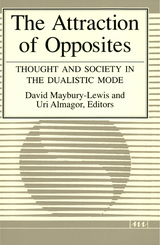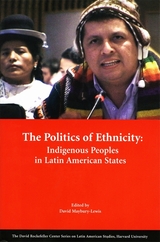

The Gê-speaking tribes of Central Brazil have always been an anomaly in the annals of anthropology; their exceedingly simple technology contrasts sharply with their highly complex sociological and ideological traditions. Dialectical Societies, the outgrowth of extended anthropological research organized by David Maybury-Lewis, at long last demystifies Gê social structure while modifying and reinterpreting some of the traditional ideas held about kinship, affiliation, and descent.
Each of the seven contributors deals with a different lowland tribe, butall of them address an ideological focus on the dualistic tribal organization that is here defined as fundamental to the Gê As a collection, their work comprises a substantial revision of the hitherto undeveloped and largely ignored ethnography of Central Brazil.

How was frontier expansion rationalized in the Americas during the late nineteenth century? As new states fleshed out expanded national maps, how did they represent their advances? Were there any distinct pan-American patterns? The renowned anthropologist and human rights advocate David Maybury-Lewis saw the Latin American frontiers as relatively unknown physical spaces as well as unexplored academic “territory.” He invited eight specialists to explore public narratives of the expansion of Argentina, Brazil, Chile, and the western regions of Canada and the United States during the late nineteenth century, a time when those who then identified as “Americans” claimed territories in which indigenous peoples, who were now seen as economic and political obstacles, lived. The authors examine the narrative forms that stirred or rationalized expansion, and emphasize their impact on the native residents.
The authors illustrate the variety and the similarities of these nationalist ideas and experiences, which were generally expressed in symbolic and cultural terms rather than on simple materialist or essentialist grounds. The cases also point out that civic nationalism, often seem as inclusive and more benign than ethnic nationalism, can produce similarly destructive human and cultural ends. The essays thus suggest a view of nationalism as a theoretical concept, and of frontier expansion as a historical phenomenon.

The indigenous people of the hemisphere have resisted a five-hundred-year assault, fighting to maintain their cultural identities. During this time, authorities in the Americas have insisted that the toleration of indigenous societies and cultures would undermine their respective states. In recent years, however, the nations of the Americas have started to reverse themselves. They are altering their constitutions and proclaiming themselves multiethnic. Why is this happening now? The Politics of Ethnicity: Indigenous Peoples in Latin American States, edited by David Maybury-Lewis, helps us understand the reasons and history behind these times of transition.
The book provides a valuable overview of current problems facing indigenous peoples in their relation with national states in Latin America, from the highlands of Mexico to the jungles of Brazil. The traditional, sometimes centuries old, relations between states and indigenous peoples are now changing and being rediscussed. The collection, authored by U.S. and Latin American anthropologists using interdisciplinary approaches, enables the reader to understand these recent developments in a comparative framework. An ambitious and quite thorough collection, it is brought together skillfully by one of the discipline’s maître penseurs.
READERS
Browse our collection.
PUBLISHERS
See BiblioVault's publisher services.
STUDENT SERVICES
Files for college accessibility offices.
UChicago Accessibility Resources
home | accessibility | search | about | contact us
BiblioVault ® 2001 - 2026
The University of Chicago Press









